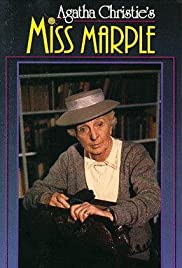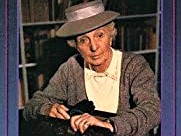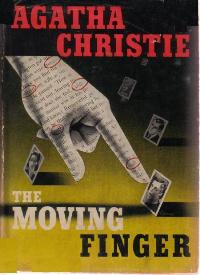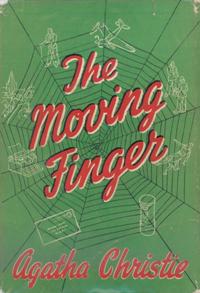Miss Marple: The Moving Finger **** (1985, Joan Hickson, Michael Culver, Elizabeth Counsell) – Classic Movie Review 9,610
Director John Boulting’s 1985 BBC two-episode TV mini-series Miss Marple: The Moving Finger stars Joan Hickson, who takes on her second case as the BBC’s Miss Marple, based on the 1942 novel by Agatha Christie, first serialised in Collier’s Weekly in eight installments.
This time, the vicar’s wife Maud Calthrop (Dilys Hamlett) summons Miss Marple to tackle a plague of vile, spiteful anonymous poison pen letters that are afflicting the previously apparently friendly idyllic English village of Lymstock.
[Spoiler alert] But soon someone dies. The coroner concludes that the local solicitor’s wife, mother of three Angela Symington (Elizabeth Counsell), took her own life after she is found dead beside one of the poison pen letters. But Miss Marple’s belief that it was a case of murder is confirmed when a second villager is killed, and the spinster sleuth goes on to deduce the real purpose of the letters, revealed the identity of the writer and unmasking the killer.
What’s especially good here is the sharp and sad-eyed Joan Hickson, of course, Andrew Bicknell and Sabina Franklyn as Gerry and Joanna Burton, Michael Culver (as Edward Symmington) and Hilary Mason as spiky Miss Emily Barton. Julia Jones’s teleplay dramatises Christie’s story expertly, while veteran movie director John Boulting does a smooth, committed job of bringing out Christie’s decadent atmosphere of spite, malice and mystery.
It first aired on 21–22 February 1985.
A second TV adaptation was made with Geraldine McEwan as Marple in the TV series Agatha Christie’s Marple, shown on 12 February 2006.
It follows Miss Marple: The Body in the Library.
Miss Marple: A Murder Is Announced, directed by David Giles, followed in 1985.
The UK TV series of films ran to 12 films from 26 December 1984 to 27 December 1992 until The Mirror Crack’d from Side to Side in 1992. All 12 original Miss Marple Christie novels were dramatised.
Agatha Christie’s 1942 book takes its name from verse 51 of Edward FitzGerald’s translation of the Rubáiyát of Omar Khayyám: ‘The Moving Finger writes; and, having writ, Moves on: nor all thy Piety nor Wit, Shall lure it back to cancel half a Line, Nor all thy Tears wash out a Word of it.’
The clever title is used both figuratively and literally. The letters point blame from one villager to the next and it is determined that the envelopes were all typed by someone using one finger to avoid a recognisable touch.
This novel features Miss Marple in a relatively minor role, entering the story only in the final quarter of the book, in a handful of scenes, after the police have failed to solve the crime.
The book was a Christie favourite: ‘I find that another I am really pleased with is The Moving Finger. It is a great test to re-read what one has written some 17 or 18 years before. One’s view changes. Some do not stand the test of time, others do.’
The main cast are Joan Hickson, Michael Culver, Richard Pearson, Dilys Hamlett, Elizabeth Counsell, Lucy Gleeson, Stuart Mansfield, Andrew Bicknell, John Arnatt, Sandra Payne, Juliet Waley, Gerald Sim, Martin Fisk, Hilary Mason, Sabina Franklyn, Gordon Rollings, Victor Maddern, Patsy Smart and Geoffrey Davion.
Miss Marple: The Moving Finger is directed by John Boulting, runs 102 minutes, is made and released by BBC, is written by Julia Jones, is shot by Ian Hilton, is produced by Guy Slater and scored by Ken Howard.
It was Roy Boulting’s final work. His half-brother Peter Cotes (born Sydney Boulting) directed the original stage production of Christie’s play The Mousetrap in 1952.
© Derek Winnert 2020 Classic Movie Review 9,610
Check out more reviews on http://derekwinnert.com





